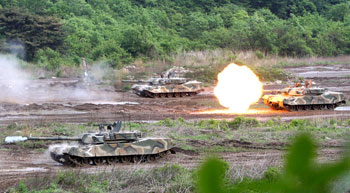(lead article)
Washington, Seoul
threaten N. Korea
S. Korea gov’t imposes trade sanctions

|
|
Yonhap/AFP/Getty Images
|
|
South Korean tanks fire during a military drill near demilitarized zone dividing Korean peninsula May 25 in Yeoncheon, South Korea. Day before Seoul cut off trade and threatened military action against North Korea, alleging that North Korean submarine sank South Korean warship two months earlier, a claim that Pyongyang denies.
|
BY CINDY JAQUITH
Prompted by Washington, the government of South Korea cut off nearly all trade and threatened military action against North Korea May 24. Seoul claimed its aggression was in response to a North Korean submarine attack on the South Korean warship Cheonan. Forty-six sailors died when the boat exploded March 26.
North Korea, also known as the Democratic People’s Republic of Korea (DPRK), denied the charges. Seoul has refused the DPRK’s repeated requests to send a delegation to the South to see the supposed evidence pointing to a North Korean military attack.
A senior DPRK official warned that if South Korean forces invade territorial waters of North Korea, the “DPRK will put into force practical military measures to defend its waters,” reported the Korea Central News Agency.
South Korean president Lee Myung-bak declared the Cheonan incident a violation of the 1953 armistice that ended the fighting between North Korea on one side, and South Korea and UN troops on the other. That war was a defeat for Washington as it sought to overthrow the revolution carried out by workers and peasants that overturned capitalist property relations in the North. The U.S. government, aided by its South Korean capitalist allies, has never ceased its military threats against North Korea since. It maintains 28,000 troops in South Korea.
In addition to the immediate economic and military actions, Lee banned North Korean commercial ships from entering South Korean waters. He also announced a resumption of “psychological warfare” broadcasts from across the border and announced that South Korean and U.S. troops will soon hold military exercises.
The president said he would ask the UN Security Council to enact new sanctions against the North. Earlier, Defense Minister Kim Tae-young reported that Seoul and Washington were discussing a new military alert level for North Korea, from 3 to 2. Level 1 was used during the Korean War.
U.S. president Barack Obama instructed his military commanders to work with Seoul to “ensure readiness and deter aggression.” Secretary of State Hillary Clinton said the White House was considering restoring North Korea to the State Department list of “state sponsors of terrorism.”
The provocative character of the U.S.---South Korean threats was demonstrated May 15, when South Korean forces fired on two North Korean patrol boats they claimed had entered South Korean waters. The North Koreans did not return the fire and left the area.
After the Cheonan blew up at the end of March, voices in the South Korean and U.S. governments accused North Korea right away. However, no evidence was put forward until May 20, when Seoul announced that its investigation had shown that Pyongyang was to blame. It charged the North Koreans sent two submarines into South Korean waters to attack the warship. The key “evidence” was a piece of metal, said to be from a torpedo, that supposedly had North Korean markings.
An article in the online Asia Times by North Korean Kim Myong Choi pointed out, “The disaster took place precisely in the waters where what the Pentagon has called ‘one of the world’s largest simulated exercises’ was under way… . It involved scores of shiny, ultra-modern US and South Korean warships equipped with the latest technology,” including torpedoes. He questions how North Korean submarines could enter the waters, elude all the U.S. and South Korean ships, fire a torpedo at the Cheonan, and escape.
Some South Korean media have also raised questions about the official story. The Korea Times noted that shortly after the Cheonan sank, both U.S. and South Korean military authorities insisted there had been no sign of North Korean vessels in the West Sea where the explosion took place. The paper also asked why there was several months’ rust on the metal part and why the supposed “North Korean markings” were handwritten.
The serial number on the part “is not how the North numbers items since it dates back to Japanese colonial times,” Chosun Ilbo reported former government minister Chung Se-hyun had said. “Some skeptics have also said the 130-ton ‘Yono’ class submarine fingered by investigators is incapable of firing a mid-sized torpedo,” the daily reported
The DPRK Foreign Ministry issued a statement May 21 saying, “It is the intention of the present U.S. administration to suffocate the DPRK politically and economically by internationalizing the sanctions against the latter.” The U.S. charges, it added, “reminds one of a thief crying ‘Stop the thief!’”
The foreign ministry further noted that the incident is being used to scuttle talks between North Korea, Washington, Beijing, Tokyo, South Korea, and Russia over North Korea’s nuclear program. The cutoff of trade by South Korea, which amounts to 14.5 percent of North Korea’s foreign trade, will be a serious blow to working people in the North. North Korean shipping costs will also be higher if forced to detour around South Korean waters.
Clinton flew to Beijing to urge the Chinese government to renew sanctions against North Korea. China is North Korea’s main trading partner and hosted North Korean premier Kim Jong-il earlier this month. Last year Beijing joined Washington and other imperialist powers in adopting a UN Security Council resolution for more sanctions against North Korea after it test-fired a missile.
Japanese prime minister Yukio Hatoyama called for passing a law allowing Tokyo to inspect ships traveling to and from North Korea.
Related articles:
White House lays out plans to strengthen nuclear threat
Okinawans rally to close U.S. military facilities
Washington pushes new sanctions against Iran
U.S. hands off Korea!
| 


